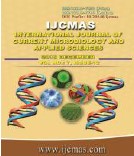


 National Academy of Agricultural Sciences (NAAS)
National Academy of Agricultural Sciences (NAAS)

|
PRINT ISSN : 2319-7692
Online ISSN : 2319-7706 Issues : 12 per year Publisher : Excellent Publishers Email : editorijcmas@gmail.com / submit@ijcmas.com Editor-in-chief: Dr.M.Prakash Index Copernicus ICV 2018: 95.39 NAAS RATING 2020: 5.38 |
Soil pollution by crude oil and its by products as a result of illegal (“Kpo-fire”) crude oil refining is one of the most common environmental challenges in the Niger Delta. This study was carried out on a laboratory scale, to evaluate the effect of illegally refined crude oil residue on soil fungi, using standard microbiological methods. Soil samples were taken from the University farm where there is no history of such contamination. The illegally refined crude oil residue (kpo-fire residue) used in this study was obtained from an illegal(artisanal) crude oil refining site in Boodo community, Gokana Local Government Area of Rivers State. The soil samples were then contaminated with various concentrations (0%, 25%, 50% and 75%) of the “Kpo-fire” residue; this was monitored every seven days, for 28days. Total heterotrophic and hydrocarbon utilizing fungal counts were investigated in the soils with varying concentrations of the illegal crude oil residue added. The mean total heterotrophic fungal counts ranged from 2.4 x 10 cfu/g to 6.7 x 104 cfu/g, while the mean hydrocarbon utilizing fungal counts ranged from 1.6 x10 cfu/g to 3.4 x 103 cfu/g. The following fungi were isolated and identified in the day 1 from the samples; Aspergillus niger, Aspergillus flavus, Penicillium species, Rhizopus sp, Fusarium solani, Mucor sp, Candida sp, Cladosporium sp and Saccharomyce species. While on day 28, only four; Aspergillus niger, Aspergillus flavus, Mucor and Rhizopus sp out of the nine isolates were identified. It was observed that the higher the concentration of the residue, the more the effect on the fungal population and diversity. The decrease in species composition and the fungal populations observed are indicative of the effect of the illegally refined crude oil residue on the soil fungal population and diversity. The continual dumping of this residue into the soil environment, will in turn affect the ecological balance, since these organisms play very important role in the ecosystem.
 |
 |
 |
 |
 |